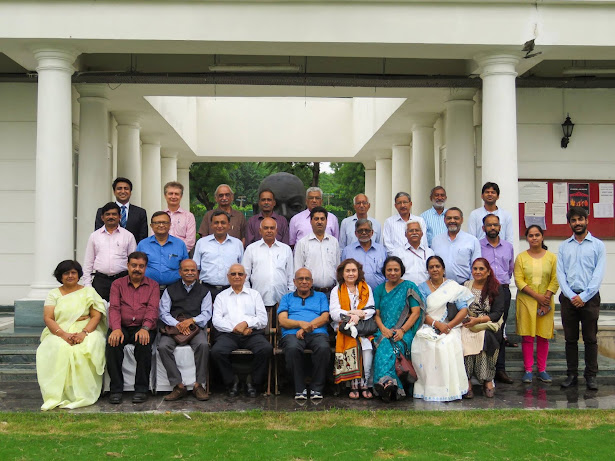Concept of Yugas: Interpretations and Clarifications
July 2, 2016Honorary Ph.D. to Mrs. Saroj Bala, Director, I-SERVE
September 24, 2016
A one day international conference was organized by I-SERVE
(Institute of Scientific Research on Vedas) on 16th July in Chanakyapuri,
New Delhi on the subject “Chronology of
Indian Culture since the Beginning of Holocene through Scientific Evidences”.
More than 25 leading scientists from all over India participated in the
conference and presented the latest research work being carried out by organizations
like Archaeological Survey of India, ISRO, National Institute of Oceanography, Birbal
Sahni Institute of Paleosciences, Anthropology Survey of India, Himalayan
Institute of Glaciology, Deccan College, Hisar University and Kurukshetra
University.
(Institute of Scientific Research on Vedas) on 16th July in Chanakyapuri,
New Delhi on the subject “Chronology of
Indian Culture since the Beginning of Holocene through Scientific Evidences”.
More than 25 leading scientists from all over India participated in the
conference and presented the latest research work being carried out by organizations
like Archaeological Survey of India, ISRO, National Institute of Oceanography, Birbal
Sahni Institute of Paleosciences, Anthropology Survey of India, Himalayan
Institute of Glaciology, Deccan College, Hisar University and Kurukshetra
University.
With the trashing of Aryan Invasion Theory as mythology based
on linguistic guesswork, it has become an important challenge for academia to prepare
an accurate chronology of the world’s oldest and biggest civilization that had
flourished in the Indian sub-continent. With the advent of superior scientific
tools and technologies for mapping, excavating and dating the early human
settlements, there is a need to run a parallel and multi-disciplinary scientific
platform for drawing conclusions about the Indus – Saraswati – Gangetic
civilization. Institute of Scientific Research on Vedas has taken up this task
of creating a platform for researchers from 10 different sciences to contribute
inputs and then identify as well as correlate common and credible conclusions.
on linguistic guesswork, it has become an important challenge for academia to prepare
an accurate chronology of the world’s oldest and biggest civilization that had
flourished in the Indian sub-continent. With the advent of superior scientific
tools and technologies for mapping, excavating and dating the early human
settlements, there is a need to run a parallel and multi-disciplinary scientific
platform for drawing conclusions about the Indus – Saraswati – Gangetic
civilization. Institute of Scientific Research on Vedas has taken up this task
of creating a platform for researchers from 10 different sciences to contribute
inputs and then identify as well as correlate common and credible conclusions.
This work has led to some ground-breaking achievements,
ranging from dating of Vedic hymns and references in Ramayan and Mahabharat to
mapping of geographical features and human settlements since the beginnings of
Holocene (10,000 BC to present). Mrs. SarojBala (Director, I-SERVE and a
retired IRS officer) has proposed the writing of scientific history based on
purely scientific evidences without any correlation with traditional history.
According to her, latest mapping of Sarasvati River course, correlation of
submerged and re-emerged settlements with sea level curve, excavations at Mehrgarh,
Rakhigarhi and Lahuradeva and latest genetic studies of Indians populations, should
all be correlated in the books reconstructing new scientific chronology of our
cultural heritage, so that it does not get lost in endless controversies. In
the words of Dr. APJ Abdul Kalam, such scientific history would push back
antiquity of Indian Culture by a few millennia (to 7000 BC), could help unite
all Indians and generate shared pride in our rich ancient heritage!
ranging from dating of Vedic hymns and references in Ramayan and Mahabharat to
mapping of geographical features and human settlements since the beginnings of
Holocene (10,000 BC to present). Mrs. SarojBala (Director, I-SERVE and a
retired IRS officer) has proposed the writing of scientific history based on
purely scientific evidences without any correlation with traditional history.
According to her, latest mapping of Sarasvati River course, correlation of
submerged and re-emerged settlements with sea level curve, excavations at Mehrgarh,
Rakhigarhi and Lahuradeva and latest genetic studies of Indians populations, should
all be correlated in the books reconstructing new scientific chronology of our
cultural heritage, so that it does not get lost in endless controversies. In
the words of Dr. APJ Abdul Kalam, such scientific history would push back
antiquity of Indian Culture by a few millennia (to 7000 BC), could help unite
all Indians and generate shared pride in our rich ancient heritage!

